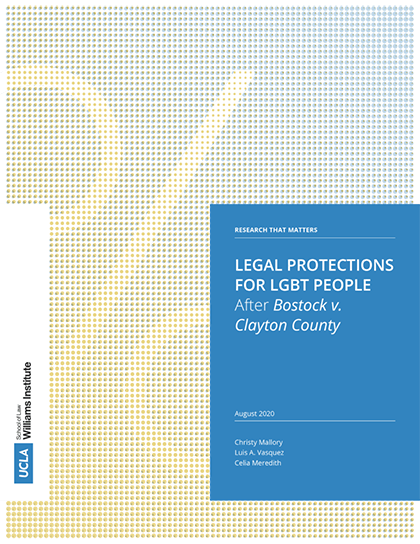Williams Institute Informs Supreme Court Win, Examines COVID-19 Risks to LGBT People
UCLA Law Magazine | Fall 2020 | Volume 43

The U.S. Supreme Court significantly altered the legal landscape for LGBT people when in June it issued its opinion in Bostock v. Clayton County, holding that Title VII’s ban on sex discrimination also bars discrimination based on sexual orientation and gender identity. The Court’s reasoning mirrored the position long advanced by UCLA Law’s Williams Institute through amicus briefs and legal scholarship: It is impossible to discriminate based on sexual orientation or gender identity without discriminating based on sex.
For nearly two decades, the Williams Institute has documented widespread and pervasive discrimination against LGBT people in employment, housing, public accommodations and other areas. Before Bostock, many LGBT people in the U.S. lacked meaningful protections from discrimination under state and federal laws. The Court’s decision guarantees that the country’s 8.1 million LGBT workers now have federal protections from employment discrimination. Institute research further shows that the decision has implications for numerous other state and federal civil rights laws that, like Title VII, prohibit discrimination based on sex.
“While the Court took an important step to affirm LGBT rights, our research shows that the most vulnerable LGBT people still face persistent disparities which have been underscored by the COVID-19 pandemic,” says Christy Mallory, Legal Director at the Williams Institute.
A collection of Williams Institute reports shows that LGBT people disproportionately experience health conditions including asthma, diabetes, heart disease and HIV that may increase their vulnerability to serious illness related to COVID-19. One report found that over 200,000 LGBT people in California have at least one of these underlying medical conditions.
In addition, a groundbreaking Williams Institute report on poverty shows that many LGBT people — particularly bisexual women and transgender people — faced economic disparities compared to their non-LGBT counterparts even before the pandemic began. In California alone, 612,000 LGBT people were living below 200% of the federal poverty level and 251,000 of them were working in industries facing substantial job losses, such as hospitality, health care, retail and construction. Other recent Williams Institute research found that LGBT people in the U.S. are disproportionately food insecure or likely to experience homelessness.
“The multi-layered economic and health effects of COVID-19 will likely make the problem worse for LGBT people and could increase their vulnerability to the virus,” says Bianca D.M. Wilson, Senior Scholar of Public Policy at the Williams Institute. “While progress has been made, it continues to be necessary to expand the scope of legal interventions to address the full range of disparities experienced by LGBT people.”